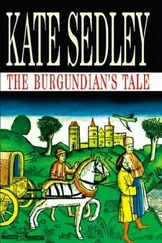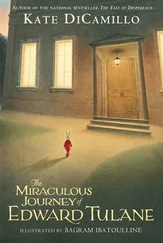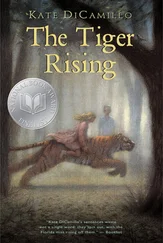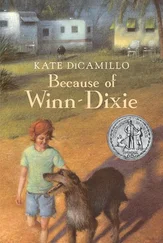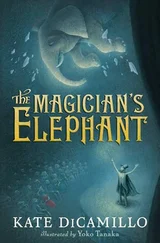On this particular day, for this particular banquet, Cook had outdone herself. The soup was a masterwork, a delicate mingling of chicken, watercress, and garlic. Roscuro, as he surfaced from the bottom of the queen’s capacious bowl, could not help taking a few appreciative sips.
“Lovely,” he said, distracted for a moment from the misery of his existence, “delightful.”
“See?” shouted the Pea. “See!” She stood. She pointed her finger right at Roscuro. “It is a rat. I told you that it was a rat. He was hanging from the chandelier, and now he is in Mama’s soup!”
The musicians stopped playing their guitars. The juggler stopped juggling. The noble people stopped eating.
The queen looked at Roscuro.
Roscuro looked at the queen.
Reader, in the spirit of honesty, I must utter a difficult and unsavory truth: Rats are not beautiful creatures. They are not even cute. They are, really, rather nasty beasts, particularly if one happens to appear in your bowl of soup with pieces of watercress clinging to his whiskers.
There was a long moment of silence, and then Roscuro said to the queen, “I beg your pardon.”
In response, the queen flung her spoon in the air and made an incredible noise, a noise that was in no way worthy of a queen, a noise somewhere between the neigh of a horse and the squeal of a pig, a noise that sounded something like this: neiggghhhhiiiinnnnkkkkkk .
And then she said, “There is a rat in my soup.”
The queen was really a simple soul and always, her whole life, had done nothing except state the overly obvious.
She died as she lived.
“There is a rat in my soup” were the last words she uttered. She clutched her chest and fell over backward. Her royal chair hit the floor with a thump, and the banquet hall exploded. Spoons were dropped. Chairs were flung back.
“Save her!” thundered the king. “You must save her!”
All the king’s men ran to try and rescue the queen.
Roscuro climbed out of the bowl of soup. He felt that, under the circumstances, it would be best if he left. As he crawled across the tablecloth, he remembered the words of the prisoner in the dungeon, his regret that he did not look back at his daughter as he left her. And so, Roscuro turned.
He looked back.
And he saw that the princess was glaring at him. Her eyes were filled with disgust and anger.
“Go back to the dungeon” was what the look she gave him said. “Go back into the darkness where you belong.”
This look, reader, broke Roscuro’s heart.
Did you think that rats do not have hearts? Wrong. All living things have a heart. And the heart of any living thing can be broken.
If the rat had not looked over his shoulder, perhaps his heart would not have broken. And it is possible, then, that I would not have a story to tell.
But, reader, he did look.

ROSCURO HURRIED from the banquet hall.
“A rat,” he said. He put a paw over his heart. “I am a rat. And there is no light for rats. There will be no light for me.”
The king’s men were still bent over the queen. The king was still shouting, “Save her! Save her!” And the queen was still dead, of course, when Roscuro encountered the queen’s royal soupspoon lying on the floor.
“I will have something beautiful,” he said aloud. “I am a rat, but I will have something beautiful. I will have a crown of my own.” He picked up the spoon. He put it on his head.
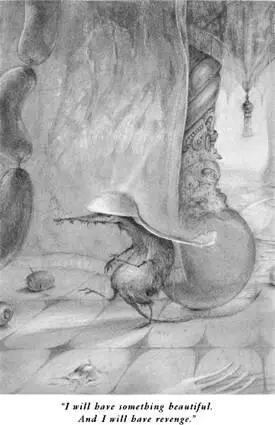
“Yes,” said Roscuro. “I will have something beautiful. And I will have revenge. Both things. Somehow.”
There are those hearts, reader, that never mend again once they are broken. Or if they do mend, they heal themselves in a crooked and lopsided way, as if sewn together by a careless craftsman. Such was the fate of Chiaroscuro. His heart was broken. Picking up the spoon and placing it on his head, speaking of revenge, these things helped him to put his heart together again. But it was, alas, put together wrong.
“Where is the rat?” shouted the king. “Find that rat!”
“If you want me,” muttered Roscuro as he left the banquet hall, “I will be in the dungeon, in the darkness.”

THERE WERE, OF COURSE, dire consequences of Roscuro’s behavior. Every action, reader, no matter how small, has a consequence. For instance, the young Roscuro gnawed on Gregory the jailer’s rope, and because he gnawed on the rope, a match was lit in his face, and because a match was lit in his face, his soul was set afire.
The rat’s soul was set afire, and because of this, he journeyed upstairs, seeking the light. Upstairs, in the banquet hall, the Princess Pea spotted him and called out the word “rat,” and because of this Roscuro fell into the queen’s soup. And because the rat fell into the queen’s soup, the queen died. You can see, can’t you, how everything is related to everything else? You can see, quite clearly, how every action has a consequence.
For instance (if, reader, you will indulge me, and allow me to continue this meditation on consequences), because the queen died while eating soup, the heartbroken king outlawed soup; and because soup was outlawed, so were all the instruments involved in the making and eating of soup: spoons and bowls and kettles. These things were collected from all the people of the Kingdom of Dor, and they were piled in the dungeon.
And because Roscuro was dazzled by the light of one match and journeyed upstairs and fell into the queen’s soup and the queen died, the king ordered the death of every rat in the land.
The king’s men went bravely into the dungeon to kill the rats. But the thing about killing a rat is that you must first find a rat. And if a rat does not want to be found, reader, he will not be found.
The king’s men succeeded only in getting lost in the dungeon’s tortuous mazes. Some of them, in fact, did not ever find their way out again and died there in the dark heart of the castle. And so, the killing of all rats was not successful. And in desperation, King Phillip declared that rats were illegal. He declared them outlaws.
This, of course, was a ridiculous law, as rats are outlaws to begin with. How can you outlaw an outlaw? It is a waste of time and energy. But still, the king officially decreed that all rats in the Kingdom of Dor were outlaws and should be treated as such. When you are a king, you may make as many ridiculous laws as you like. That is what being a king is all about.
But, reader, we must not forget that King Phillip loved the queen and that without her, he was lost. This is the danger of loving: No matter how powerful you are, no matter how many kingdoms you rule, you cannot stop those you love from dying. Making soup illegal, outlawing rats, these things soothed the poor king’s heart. And so we must forgive him.
And what of the outlawed rats? What of one outlawed rat in particular?
What of Chiaroscuro?
In the darkness of the dungeon, he sat in his nest with the spoon atop his head. He set to work fashioning for himself a kingly cape made out of a scrap of the red tablecloth. And as he worked, old one-eared Botticelli Remorso sat next to him swinging his locket back and forth, back and forth, saying, “You see what comes from a rat going upstairs? I hope that you have learned your lesson. Your job in this world is to make others suffer.”
Читать дальше






